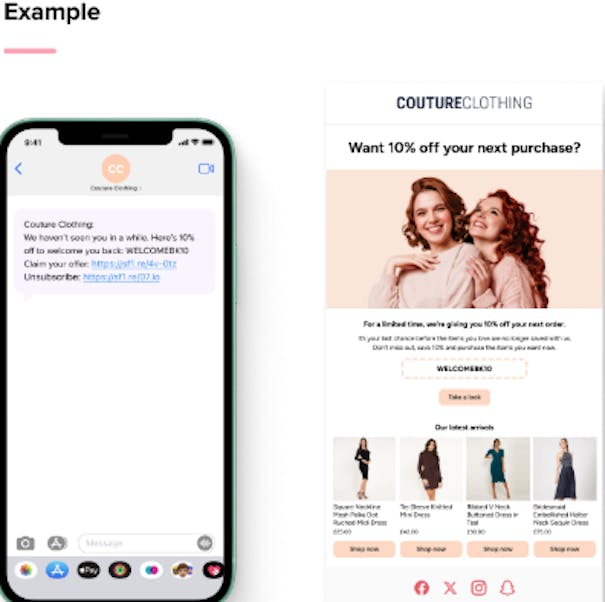Help Centre
<
HomeAs communications from the Salesfire platform can be sent across several channels, it's important to understand the definition of transactional and marketing communicaitons along with the differences between these cases.
All communications across channels must follow GDPR regulations. Failure to comply could result in fines.
What are Transactional Communications?
Transactional communications are sent following a specific action, such as purchase, or when a user has made a request, such as saving their basket. Legitimate interest’ is the lawful basis for transactional communications and can only use a shopper's data for a limited purpose (1). This differs from other lawful bases as it is not tied to a specific purpose and is not processing that the individual has specifically consented to. If you were to include marketing/promotional material on a transactional email/SMS, it would no longer qualify under ‘legitimate interest’ as the marketing element is not a necessary part of the transaction.
Transactional emails/SMS messages are time-sensitive, sent to specific individuals rather than a group of people and have higher open rates/engagement than market messages (2). They don't need a user to unsubscribe/user opt-out, however, it is considered best practice to give an unsubscribe option and link to your privacy policy. For transactional communications, businesses may retain data as long as needed to fulfill the original purpose, such as the transaction and related details.
Legitimate Interest under GDPR (1)
Legitimate interest is one of the six lawful principles for processing personal data. Businesses must have a lawful basis to process data which comes under the GDPR principle of ‘lawfulness, fairness and transparency’. The ICO’s stance states:

- Legitimate interest differs from other lawful bases as it is not tied to a specific purpose. Purposes could include: performing a contract with the individual, meeting legal obligations, safeguarding vital interests or performing a public task. It is also not processing that the individual has specifically consented to.
Legitimate interest offers more flexibility and could apply to any type of processing for any reasonable objective. - Legitimate interest can be used as your lawful basis for processing personal data to fulfil a particular purpose if the purpose is legitimate and the processing benefits you or a third party.
How do users opt-in to transactional communications?
- Sign up forms
- Purchases
- Account registration
Examples of transactional communications
- Abandoned Orders
- Save My Basket

What are marketing communications?
Marketing communications are sent to users who have explicitly opted-in to receive marketing content. These marketing emails/SMS messages could be promotional content about the company, products, incentives or newsletters.
Marketing communications tend to be strategic in nature and can involve one-time or automated campaigns. In terms of automated campaigns, it depends on the nature of the campaign as to whether the message should be transactional or marketing.
Marketing messages are usually sent in bulk to a large email/SMS list at roughly the same time.
How are users opted-in to marketing communications?
- Overlay sign-up
- Digital Assistant sign-up
- Sign-up forms on website
- Signing up to receive a newsletter
Examples of marketing communications
- Mailing List Voucher Confirmation
- Re-engagement
- Post Purchase Recommendations
- Price Drop
- Back in Stock

Differences Between Transactional vs Marketing Communications
